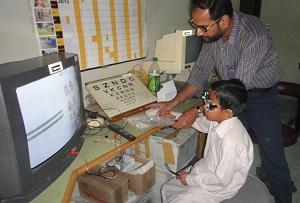Join a powerful, unprecedented alliance for better eye health for all.
Join IAPB-
Choose an alternate language here
Refractive Error is one of the leading causes of visual impairment in Pakistan. The situational analysis of Refractive Services in Pakistan, which was conducted in 2006 by the Ministry of Health (MoH) and Sightsavers, revealed that for Pakistan’s population of 156 million, there are approximately 2.7 million children in need of refractive correction.
IAPB has very timely supported Sightsavers under the “Seeing is Believing” initiative to extend refractive error services to children at school level through the Pakistan Urban Pediatric Eye Care programme (PUPEC). Since 2011, the project has been able to reach over 1.2 million children for eye screening and also provided more than 45,000 spectacles, 1,900 surgeries and 472 Low Vision Devices to under privileged children free of charge.

The National Eye Health Committee (NEHC) is one of the apex forums where issues are highlighted, discussed and decisions are made by key stakeholders in eye health. During the life of the project, a number of advocacy initiatives have been carried out to highlight the importance of school eye health as a part of the school health programme in the country. The following major achievements have been made using this forum:
The Health department of the Government of Punjab (the largest province in Pakistan) has agreed to incorporate child eye health indicators with gender breakdown in provincial HMIS.
The National Action Plan of the National Programme for Prevention and Control of Blindness has been developed in alignment with the Global Action Plan on eye health. As a result of Sightsavers’ advocacy work, the National Action Plan endorses School Eye Health as part of the School Health Programme.
These initiatives will pave the way for Sightsavers and other stakeholders making eye health an integral part of the School Health Programme in the country in the future.

Sightsavers Pakistan
[email protected]